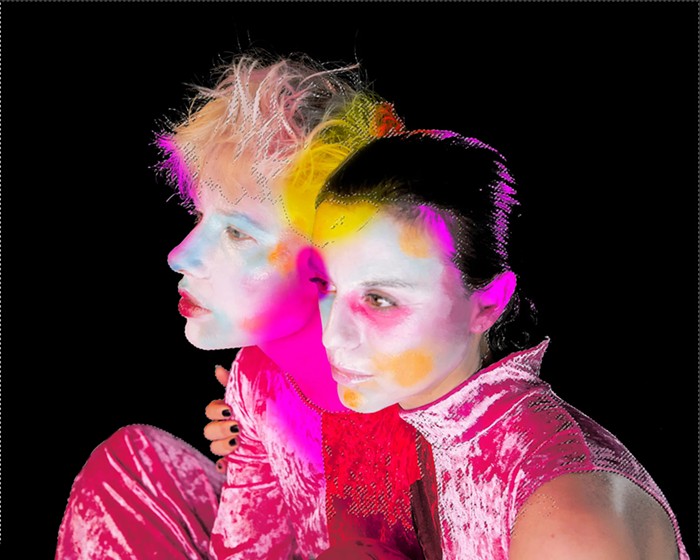A band called Teeph, in from Chico, California, are packing up their gear after playing an intense set at the Kraken in the University District. Before them, heavy fuzz duo Noise-a-Tron had blown the show open with their wall of feedback and distorted melody. People are visibly exhausted.
"I don't wanna play," jokes Demian Johnston, leaning against a table by the bar. His band Great Falls is headlining. Johnston and bassist Shane Mehling talk through the logistics of stringing hammocks across the stage and taking naps for the audience. Sleep as performance art. Ten minutes later, though, they've taken the stage, and Johnston is screaming the skin off his lungs while Mehling hurls himself into the crowd, bass and all, as they break into "Wound Instructions"—a scorching track from the band's magnificently brutal 2013 full-length Accidents Grotesque.
As the crowd pulls itself out of its stupor, gleefully pushing Mehling around in front of the stage, the trio (rounded out by drummer Phil Petrocelli) plays a mix of older tracks and new material from an album they haven't even recorded yet. This as-yet-unnamed full-length is entirely written—they're using a string of June and July dates to fine-tune their parts before laying them down for good in the studio with longtime producer Jeff McNulty this August. The rawness of the songs only accentuates their punishing live presentation, making for some of their best shows to date.
"[Playing live] helps me work out stuff," explains Johnston, the band's guitarist/vocalist. "I've got the lines, and I sorta know how I want to do them, but things always change live. And sometimes—maybe because I'm out of breath or something—I'll deliver something slightly different, and in the back of my head, I'll say, 'That was awesome, I should remember how I did that.' Writing in the bubble is fine, but you play [new songs] in front of people, and you realize there are little things that could be more effective," he adds. "So hopefully we can play most of the record at shows at least once before we end up recording."
Great Falls' songs seem to have a mind of their own when thrown in the blender with the band's almost unparalleled live energy. Mehling's near-psychotic "stage" presence (he often finds himself on the floor, getting personal with the audience) is legendary, and his back-and-forth rocking to begin each set has become a warning flare to signal the band's unruly intentions. Johnston speed-picks contortionist riffs with an ice-cold calm and then shatters the air with his piercing scream. Petrocelli is deceptively hard-hitting, working a massive eight-cymbal kit with unbelievable precision.
Great Falls have slowly gained a following with local hard-rock fans, but Johnston and Mehling have been lighting up stages like this since they played together in early-2000s hardcore band Playing Enemy. When that band broke up, the two went on to form Hemingway—a two-person noise project with a drum machine—which morphed into Great Falls. Shortly thereafter, they added Jesu/Black Noise Cannon drummer Petrocelli, who had been popping up at their shows.
"I think when we were done with Playing Enemy, Demian and I had some pretty grand ideas of wanting to do stuff that was... softer, and keyboard-oriented, and that was fine," remembers Mehling. "But especially by the time Phil joined the band, it was the idea that this is the sort of music we're happiest playing... The other stuff is great to listen to, but if I'm going to get up on stage and play something, I don't want to play something that's not really aggressive."
As a three-piece, they started playing heavy rock that resembles hardcore or grindcore's churning riffs and forceful vocals, but is also stretched over mathy structures and accented by industrial moods (aided by Petrocelli's pistonlike splash cymbals) with flecks of jazz influence. Over the course of two full-length albums and a handful of demos and shorter split projects, their abstract visions and unconventional musical phrasing—coupled with a very relatable aggression in their sound and lyrics—has made them one of the most continually exciting bands in town. Their recently released metal cover of the "Battle Theme from RoboCop" is an awesome example of their willingness to experiment behind the scenes. But don't call it jamming.
"We don't really do that," says Petrocelli. "I think jamming is intrinsically a laying-back activity, and what we do is definitely a leaning-forward thing. I think jamming is the opposite of focus, and what we do really well is focus on things. In the new stuff—and even on the last record—when we were writing, everything's focused on supporting the riff. Maybe not in the Matt Pike sense of it—but support it, and lean into it, and do something totally fucked up that we're excited about." ![]()



















